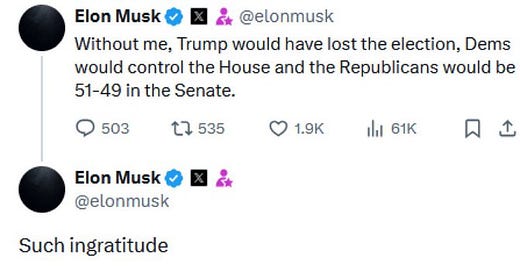Musk’s magical ROAS
The man who built an advertising-averse car company now swears by his political return on advertising spending (ROAS)
Elon Musk has always taken a curious pride in not spending big on advertising. Tesla’s meteoric rise was, in his telling, proof that a superior product—and a CEO with 220 million followers—renders paid media optional.
So it’s rich to hear him insist that Donald Trump “would’ve lost” the 2024 election without Musk’s “massive” financial support. According to Axios, that support rang in at nearly US $300 million for Trump and down-ballot Republicans—a jaw-dropping sum even before we recall that the self-styled ad skeptic once claimed you could build a powerful brand on a shoestring.
The $10.5 Billion backdrop
To be clear, advertising did matter in 2024. According to NPR, total political ad spend hit US $10.5 billion, up a cool billion from 2020. Democrats outspent Republicans US $5 billion to $4.1 billion, and Pennsylvania alone soaked up US $1.2 billion—the first state ever to cross the billion-dollar line.
Drop Musk’s contribution into that ocean and it looks like, well, a very large raindrop. Impressive? Absolutely. Singularly decisive? That’s a much harder thesis to defend.
Marketers wrestle with attribution every day:
Multiple touchpoints muddle the picture. Was it the YouTube pre-roll, the doorstep flyer, or a TikTok meme that nudged a wavering voter?
Channel overlap blurs causality. In politics, TV, digital, SMS and field operations all hit the same targets in tight windows.
Lagging indicators cloud timelines. Fund-raising spikes, polling swings and turnout models rarely point to a single ad blitz.
Even with terabytes of voter-file data and programmatic dashboards, proving that one spender tipped a national election is like claiming a single Super Bowl spot rescued Bud Light’s brand. Possible? Maybe. Empirically airtight? Hardly.
Why Musk’s claim rings hollow
Scale mismatch – $300 million is huge, but it’s less than 3 % of total 2024 spend. In Pennsylvania alone, Trump’s side and independent groups poured in nearly twice Musk’s entire outlay.
Uneven lift – Down-ballot GOP performance was mixed. If Musk’s dollars were the tide that lifted all boats, why did some still sink?
The counter-narrative factory – Trump loves a foil. Musk’s boast hands him an easy retort: I won on charisma, message and ground game—no billionaire bailout required.
What this teaches marketers
Claims of singular credit hurt credibility.
ROAS is a directional tool, not gospel.
Musk might genuinely believe his money carried the day. He’s earned the right to flex. But in politics, as in commerce, the louder the victory lap, the taller the attribution hurdle.
If the man who built an advertising-averse car company now swears by his political ROAS, marketers should do two things: smile at the irony and keep their measurement models honest.





